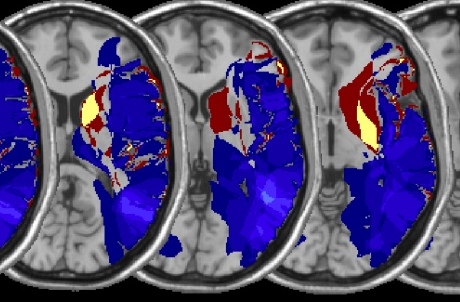Offering a reward can improve visual awareness in stroke patients
by Sam Wong

A painting by a patient with spatial neglect
Stroke patients who have difficulty paying attention to part of their visual field may perform better when offered a reward.
Stroke patients who have difficulty paying attention to part of their visual field may perform better when offered a reward, a study by Imperial College London and Brunel University researchers has found.
Between a third and half of stroke patients suffer from spatial neglect - a disorder of visual attention that means they do not notice objects on one side of their field of view. In some cases, sufferers have been known to shave only one side of their face or leave half of a meal on their plate.
The new study found for the first time that patients with neglect did better in clinical tests when they were promised a financial reward. The findings point towards new behavioural therapies for stroke patients, and also highlight a system in the brain that can be targeted by drugs.
Dr Paresh Malhotra, from the Division of Brain Sciences at Imperial College London, who led the study, said: “There’s been a lot of research recently on how reward can improve attention in healthy people. We wanted to see if performance would improve in patients with spatial neglect if you offer them a reward.”
Ten patients with spatial neglect at Imperial College Healthcare NHS Trust were given a test that required them to circle images of coins on a sheet of paper with lots of similar-looking round objects. They were told they would get a pound for each coin they circled. They also performed a similar test with buttons instead of coins, and were told there was no reward for this test.
After their first visit, all the participants were given £15 worth of vouchers, although they were told that the value was determined by their performance in the coin test. They were given the same tests again on a later date, with a reward again promised for the coin test but not the button test. On the second visit, eight out of ten did better on the coin test. There was no improvement on the button test.
“Clearly we can’t offer patients money, but the results suggest that other sorts of motivational stimuli might be useful in stroke rehab,” Dr Malhotra said.
The researchers think the improvement in performance might be down to a brain chemical called dopamine, which has been found to improve attention in some patients with this condition. Many previous studies in healthy people and animals have found that dopamine levels rise when we anticipate a reward, such as food, sex or money. Dopamine is thought to make people feel motivated to behave in ways that bring about the reward.
The researchers did not measure dopamine levels in this study, but the two patients whose performance didn’t improve when offered a reward had damage in a brain region called the striatum, which is recognised as a key area where dopamine is released. “There’s a lot of work linking reward with dopamine, so another implication is that we are harnessing the brain’s own dopamine system to bring about these effects,” Dr Malhotra said.
The findings are published in the Journal of Neurology, Neurosurgery, and Psychiatry. The research was funded by the Academy of Medical Sciences, the Wellcome Trust, and the National Institute for Health Research Imperial Biomedical Research Centre.

Brain scans show damage to the right striatum in patients with spatial neglect.
Reference
P Malhotra et al. ‘Reward modulates spatial neglect.’ Journal of Neurology, Neurosurgery, and Psychiatry, 29 October 2012
Article supporters
Article text (excluding photos or graphics) © Imperial College London.
Photos and graphics subject to third party copyright used with permission or © Imperial College London.
Reporter
Sam Wong
School of Professional Development